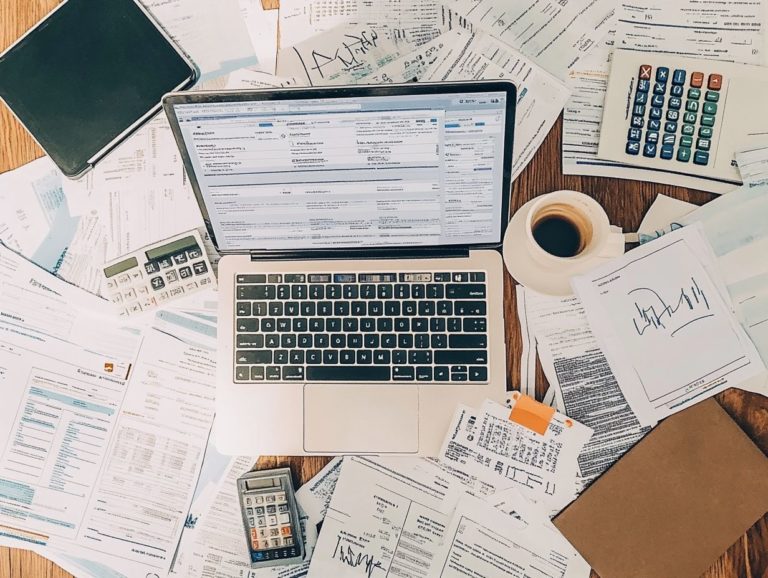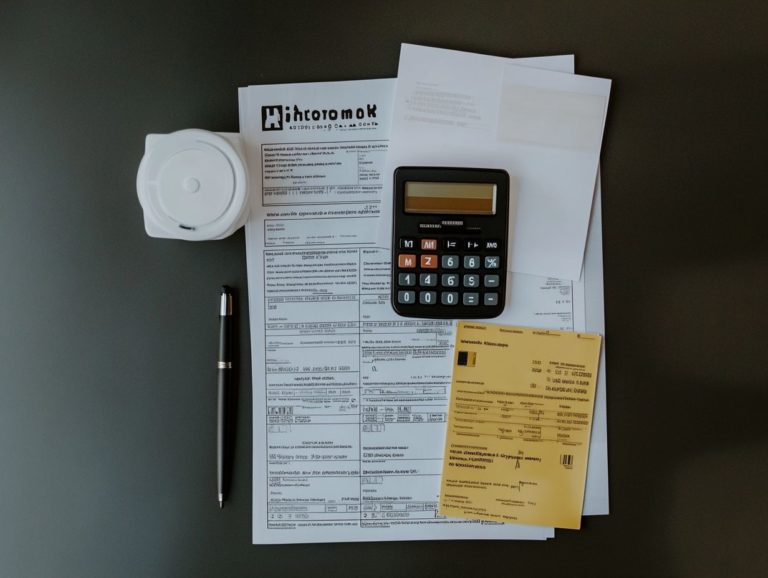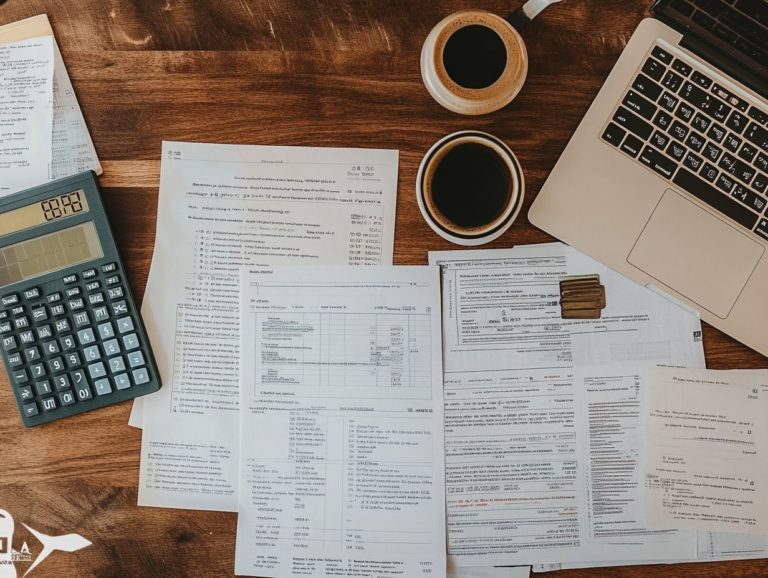Freelancers: What to Do When You Miss a Tax Deadline
Navigating the world of taxes can be particularly challenging for freelancers like you, who often juggle multiple clients and tight deadlines. Understanding tax deadlines is crucial; they significantly impact your financial health. If you miss these deadlines, you will face penalties and unnecessary stress, which no one wants.
This guide covers the consequences of missed deadlines, outlines the steps you should take if you find yourself in this situation, and offers tips to help you stay organized, including tax management strategies. It also covers the benefits of working with a tax professional to simplify the process. Read on to empower yourself with knowledge and keep your freelance career on the right track!
Contents
- Key Takeaways:
- Understanding Tax Deadlines for Freelancers
- Consequences of Missing a Tax Deadline
- Steps to Take When You Miss a Tax Deadline
- Tips for Avoiding Missed Tax Deadlines
- Working with a Tax Professional
- Frequently Asked Questions
- What is a tax deadline for freelancers?
- What happens if I miss a tax deadline as a freelancer?
- Can I file for an extension if I miss a tax deadline?
- What steps can I take to avoid missing a tax deadline as a freelancer?
- What should I do if I realize I have missed a tax deadline?
- Is there any leniency for missed tax deadlines for freelancers?
Key Takeaways:

- Assess the situation and take immediate action when you miss a tax deadline as a freelancer.
- Understand the potential consequences, such as penalties and fees, of missing a tax deadline and work to avoid them.
- Consider working with a tax professional to help you stay organized and meet all tax deadlines in the future.
Understanding Tax Deadlines for Freelancers
Understanding tax deadlines is essential for freelancers. Timely compliance with the rules set by the Internal Revenue Service can significantly impact your financial health and help you avoid penalties.
As a freelancer, you face unique tax obligations that differ from those of traditional employees. This makes it crucial for you to stay informed about tax deadlines to manage your finances effectively.
For instance, you need to submit your tax return by April 15. Many freelancers find it helpful to use tax resources like TurboTax or Keeper to navigate their unique tax situations.
The importance of adhering to these deadlines cannot be overstated. Missing them can lead to financial stress, accrued interest, and complications with compliance, especially for freelancers who should be aware of freelancer tax filing mistakes to avoid.
What are Tax Deadlines and Why are They Important?
Tax deadlines are specific dates by which you must file your tax returns and meet your tax obligations to avoid financial stress and compliance issues. Understanding these deadlines is essential; if you miss them, you will face penalties and interest charges that can pile up quickly, negatively affecting your financial health.
Timely tax payments ensure compliance with federal and state regulations and bolster your credit profile by demonstrating responsibility and financial reliability. By adhering to 5 important tax deadlines for freelancers, you can alleviate the stress of tax season, allowing you to focus on proactive financial planning instead of scrambling to address oversights. For many, sticking to tax deadlines can be the key to smooth financial operations rather than facing daunting repercussions.
Consequences of Missing a Tax Deadline
Missing a tax deadline can lead to significant repercussions for you as a freelancer. You might face late filing penalties, late payment fees, and accrued interest on any unpaid taxes. Together, these can exacerbate financial stress and complicate your efforts to resolve tax issues.
Possible Penalties and Fees

Possible penalties and fees for missing tax deadlines include significant late payment charges, late filing penalties, and the risk of losing valuable tax credits and refunds. These consequences can accumulate rapidly, especially for you as a freelancer, where timely income and cash flow are crucial.
If you make a late payment, you could face a penalty of 0.5% of the unpaid taxes for each month it lingers. While that might seem manageable at first, it can quickly snowball into a considerable amount over time. To avoid this situation, it’s essential to understand how to handle back taxes as a freelancer. Late filing penalties can soar up to 25% of the amount owed, which could severely strain your budget and hinder your ability to invest in future projects.
Fortunately, there are tax relief options available, such as installment agreements that allow you to pay your taxes over time, or offers in compromise that let you settle your tax debt for less than you owe. To ensure you avoid penalties while managing your finances, consider exploring how to avoid tax penalties as a freelancer. These options may offer some respite for those navigating financial challenges, especially during a tax year with unexpected expenses.
Don’t wait take control of your tax situation today by reaching out to a professional or using helpful tax software!
Steps to Take When You Miss a Tax Deadline
When you miss a tax deadline, it s essential to assess the situation quickly and take decisive action to mitigate potential penalties, interest, and the impact on your refund.
Engaging a tax professional can greatly enhance your ability to navigate tax resolution options and establish a manageable payment plan with the IRS, while also addressing disaster relief if applicable.
Assessing the Situation and Taking Action
Assessing your situation after missing a tax deadline is crucial. As a freelancer, you should consult tax professionals without delay to explore resolution strategies that can alleviate financial stress while ensuring compliance with IRS regulations.
Tax situations can be complicated. It’s easy to miss deadlines. A tax professional can conduct a thorough evaluation and guide you through your options, whether it’s filing late returns, setting up payment plans, or pursuing an agreement with the IRS called an ‘Offer in Compromise’ to help reduce penalties.
Gathering the necessary documentation and records to substantiate your income and expenses is essential during this process. By taking these proactive steps, you not only rectify your tax status but also position yourself for future compliance, transforming what once felt like a stressful situation into a manageable one.
Tips for Avoiding Missed Tax Deadlines
Stay proactive! By implementing effective organizational strategies and adopting sound tax management techniques, you can significantly minimize the risk of missing tax deadlines as a freelancer. This approach keeps you compliant and saves you from those pesky penalties, allowing you to focus more on your work and less on tax-related worries.
Organizational Strategies and Tools

Utilizing effective organizational strategies and tools, such as tax management software and meticulous record-keeping of your business expenses, can significantly alleviate financial stress and streamline your tax filing process. This allows for better tracking of business expenses.
By integrating dedicated applications like QuickBooks or FreshBooks, you can effortlessly track your income and expenditures, ensuring that nothing slips through the cracks. Using spreadsheet tools like Google Sheets gives you the flexibility to customize your data management, providing a clearer overview of your finances.
Use calendar apps to remind you of important tax deadlines. This keeps you proactive. These technological advancements simplify the often complex task of tax compliance, enabling you to focus more on your craft while maintaining a clear and organized financial picture.
Working with a Tax Professional
Collaborating with a tax professional offers freelancers a wealth of advantages, including expert insights on tax resolution, tailored compliance strategies, and guidance through intricate tax scenarios that often accompany their distinct tax obligations.
Benefits and Considerations
The advantages of collaborating with a tax professional are significant. You can maximize your eligibility for tax credits, ensure your tax filings are accurate, and potentially uncover additional deductions tailored specifically to your unique financial situation as a freelancer.
By tapping into their extensive knowledge of self-employed tax regulations, these experts can pinpoint opportunities that you might overlook. However, it s essential to consider a few key factors when choosing the right professional for your needs.
A solid background in freelance or self-employed tax matters is crucial, as this expertise directly influences the quality of advice and strategies you’ll receive. For instance, understanding how to manage tax payments as a freelancer can be invaluable. Responsiveness and a good rapport are also vital, enabling you to feel at ease when discussing your financial concerns.
Ultimately, partnering with a knowledgeable tax professional can lead to more favorable tax outcomes, including potential refunds and granting you the peace of mind you deserve.
Frequently Asked Questions
Don t let missed deadlines stress you out! Take action today for a brighter financial future.
What is a tax deadline for freelancers?
A tax deadline is a specific date set by the government for filing and paying taxes. In the U.S., it’s usually April 15th.

What happens if I miss a tax deadline as a freelancer?
Miss a tax deadline as a freelancer? You might face penalties and interest on the taxes owed. This could also delay any refund and hurt your credit score.
Can I file for an extension if I miss a tax deadline?
Yes, freelancers can file for an extension if they miss a deadline. Keep in mind that an extension only gives you more time to file your tax return, not to pay any taxes owed. Interest and penalties may still apply for late payments.
What steps can I take to avoid missing a tax deadline as a freelancer?
To avoid missing a tax deadline, keep track of important tax dates and set reminders. It’s also wise to work with a tax professional to stay organized and manage your responsibilities.
What should I do if I realize I have missed a tax deadline?
If you realize you missed a deadline, act quickly to minimize penalties. File your tax return as soon as possible. Pay any taxes owed or set up a payment plan with the IRS. Communicate with the tax authorities and explain your situation.
Is there any leniency for missed tax deadlines for freelancers?
There may be some leniency for missed deadlines, depending on your circumstances. If you have a valid reason, like a medical emergency, you can request penalty relief. It’s best to consult with a tax professional for guidance in these situations.






